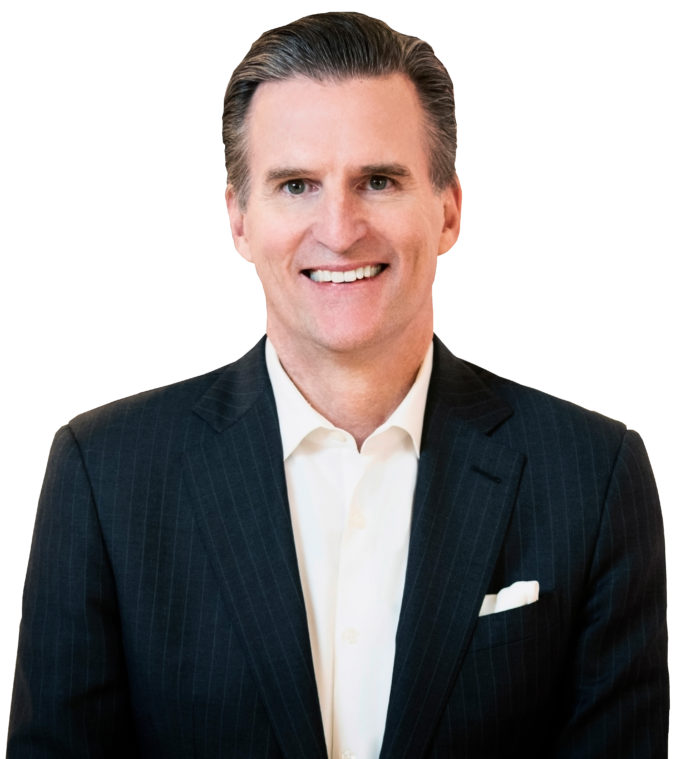
Macy’s Chief Executive Jeff Gennette sees prices of overstocked items falling soon. “Customers are about to get some amazing deals on products that were hot during the pandemic,” says Gennette, who has run the biggest U.S. department-store chain since 2017.
Markdowns on excess inventory of everything from sweatpants to home goods could pinch retailers’ profit margins, however. Consumers changed their spending habits this year faster than expected on items for the office, dining out, and travel. “In a lot of cases, they’re visiting our stores again to see and touch products,’’ Gennette adds while seated in a dark paneled conference room above Macy’s flagship store in Manhattan.
The 61-year-old CEO is trying to breathe new life into its brick-and-mortar stores, which face existential threats from online competitors, fast-fashion retailers, and discount chains. His solution? Forge firmer ties between Macy’s virtual and physical settings. “We are focused on building a comprehensive omnichannel ecosystem,” Gennette explains.
His iconic employer, launched in 1858, today includes luxury Bloomingdale’s, discount outlets mainly inside Macy’s department stores, and smaller off-mall stores with extra digital services. “The second we add those off-mall stores,” Gennette observes, “the digital business in those ZIP codes goes up astronomically.”
Macy’s hired Gennette as an executive trainee in 1983 after the English literature major graduated from Stanford. He has worked for the chain ever since, except for a brief stint running an FAO Schwarz store. He developed a reputation for spotting trends as he steadily advanced, becoming Macy’s president in 2014. Gennette says being one of the few openly gay leaders of a Fortune 500 company has influenced his management style.
TIME recently spoke with Macy’s top boss about e-commerce’s rosy outlook, increased personalization of brick-and-mortar shopping, and his “authentic self” approach to leadership.
The interview has been condensed and edited for clarity.
Why will we need department stores in the future? And how should they change to thrive within an omnichannel approach that promotes digital and in-store shopping?
The omnichannel customer is going to continue to be vibrant in America, leading to healthy brick-and-mortar brands because those customers buy more frequently and are more profitable.
Five years from now, that seamless exchange between brick and mortar, a very developed app, and e-commerce sites is going to be super fast and tailored to an individual. A one-to-one relationship is where omnichannel is going by anticipating customers’ needs at that moment.
Our customers in a cocoon during the pandemic are going into stores again. They want to try things on. Size fit is a big pain point for buying on the internet. And the younger generation is very prime to go to stores. There are on-ramp categories for them like toys, engagement rings, and a job interview suit. We’re making sure our future is highly relevant for all demographics.
Brick-and-mortar retail is not for the faint of heart. There are a lot of investments required and tradeoffs to manage. Within malls, we’ve got great real estate. We’ve just got to make our store locations relevant. Customers’ expectations continue to evolve. The interplay between digital and physical is irrefutable. You have to have both channels—and potentially the metaverse in the future.
COVID-19 accelerated Americans’ shift to shopping online. What lies ahead for e-commerce?
It’s going to expand further, but never to a point where stores are irrelevant. The human need to connect in a physical location is always going to be important
In fiscal 2010, digital commerce represented 5% of Macy’s net sales. By fiscal 2021, it represented 35%—or about $8.6 billion. How soon will you reach your goal of selling $10 billion of goods online annually?
We initially thought we’d get there by the end of 2023. But the timing is probably going to be off by a year, with more business going to stores this year because we’re in a different stage of the pandemic—more of an endemic.
What portion of your annual net sales will come from e-commerce by 2027?
40%-plus. Over the next 10 years, stores are still going to be more than 50% of the overall business. My job is to make sure the experience Macy’s customers have in brick-and-mortar stores meets their expectations and the way they want to shop. A store has to serve many shopping occasions for the same customer. You better have game plans imagined for all those journeys.
What obstacles must you overcome to complete Macy’s transformation into a digital led retailer with a substantial physical presence?
One big goal is to expand into the off-mall sector. About 60% of American brick-and-mortar business is done off mall, where Macy’s now has got a very, very shallow footprint. We’re in the pilot stage of making a small store format work there. We started opening our first off-mall ones about a little over a year ago. More are coming this year. The rate of new customers coming to Market by Macy’s—one of our off-mall concepts—is higher than full-line stores in markets they serve.
You employ numerous personal stylists who offer virtual and in-store appointments along with tailor-made recommendations. Where is personalized shopping headed next?
The bigger point is how to have a shopping experience that meets customers’ needs in that moment. A lot know what they want when they walk into a store. They don’t want to wait. That transaction needs to be speedy. Other customers want a fitting room and a knowledgeable Macy’s colleague. They’re booking appointments for a more fulsome shopping experience. We’re working through the technology. We’re training all our colleagues to be ready.
We help bring out your unique style for yourself, your family, and your home with a gigantic menu of brands and content from off-price to luxury. We do that fairly well digitally. Doing that in a physical setting has been more difficult, but one we’ve set out to accomplish.
You unveil the first of 400 Toys “R” Us shops inside Macy’s locations this month, with the rest opening by October. Greeted by Geoffrey the Giraffe, kids will have areas to play with Legos, dolls, and other toys. What’s your rationale for this significant move? Should rival U.S. chains also revamp handle customers’ in-store experiences?
A more engaging experience for toys is something we can uniquely provide that other department stores either aren’t aspiring to do or won’t be able to do. We saw toys as a woefully underrepresented category in experiential retail. Go down one of our competitor’s main aisles. There isn’t a place where a kid can play with the goods.
Toys “R” Us was a unique opportunity for us to create a department store toy experience at scale. We’re putting great capital against it. Customers will come to the shops because their kids want to play there. We brought the Toys “R” Us brand online last year. Many of those online customers are new to Macy’s, and 75% are now buying something else. It’s an opportunity to seed behavior. The challenge for retailers is: How do you take digital assets customers are quite comfortable navigating and bring them into your physical store experience? You give them delight by exposing them to new brands and services they weren’t thinking they wanted when they came in.
Amid soaring inflation, is Macy’s raising as well as cutting prices?
We have been very selective about where we raise prices. Every customer has a device that can check prices anywhere. You’ve got to be super careful about raising prices for basic commodities like a T-shirt. It’s much easier to put price increases into trending categories. For some fashion items, like a dress or a man’s suit, you’re going to see higher prices.
You often talk about coming out as a gay man soon after you joined Macy’s. How has bringing your authentic self to work benefitted your longtime employer?
Early in my career, I made the decision to live out loud and be my authentic self. But that probably was going to tamp down my ability to advance. There were no gay CEO examples I could look to in retail. I happened to be at Macy’s California, then one of the most diverse companies and very supportive of the gay community. They kept saying, ‘You can go to the next level.’ Yet when I was the only gay person in a room of senior leaders, I always felt like an outsider. Was my perspective going to be valued? As I got higher, it was very important for me to seek opinions of others in the room. They might feel their opinion wouldn’t be welcome because of their diversity. People got more comfortable expressing their point of view. I have been very purposeful about doing that on all teams I create and influence. I preach what I experienced.
How did encouraging colleagues to bring their authentic selves to work and speak frankly during meetings make you a better leader?
Equity is a very important component of how you get to an inclusive environment. An executive team is like a stadium. Who’s on the playing field, making the calls, and driving strategy? If your diverse populations are on the sidelines, you’re not as effective. You have to have an inclusive environment where everybody feels like ‘I’m showing up with all my ideas and experiences.’ Until everyone feels valued, you’re not going to maximize the potential of your brand that’s serving the most diverse population this country has ever had.
Why should CEOs of other companies bring their authentic selves to work?
Bringing your authentic self gives everybody else permission to do so. It also gives you the opportunity to contribute in a way that breeds trust, followership, and retention. That’s one of the secret sauces of our culture I’m quite passionate about. The authentic self idea is a litmus test of how you maximize your colleagues’ full potential. The sky’s the limit when you get that done.
You’re the guiding hand behind Mission Every One, Macy’s new social purpose platform. It aims to invest $5 billion in various areas including businesses with diverse owners. How does your involvement reflect your personal experiences?
Mission Every One is as important as living my life as a gay man and not separating it from my work. Having our lives celebrated in their fullness is what I want for all our colleagues. We must also make Macy’s a much bigger tent, representative of communities we serve.
You love words so much that you majored in English literature and now play Scrabble every day. Should more boards pick CEOs with undergraduate English degrees?
Having been an English lit major helps me in devising a great strategy that can be executed. But when I was coming through college, my worried mother asked, ‘What’s your career going to be when you’re majoring in English?’ I didn’t worry. I paid for college managing the faculty club. Commission sales worked well for me, and I could manage people well. I decided, ‘Let’s do that in retail.’ I have enjoyed retail so much. After almost 40 years, I still can’t wait to tackle opportunities to serve customers every day. You should do what you’re passionate about.
More Must-Read Stories From TIME








